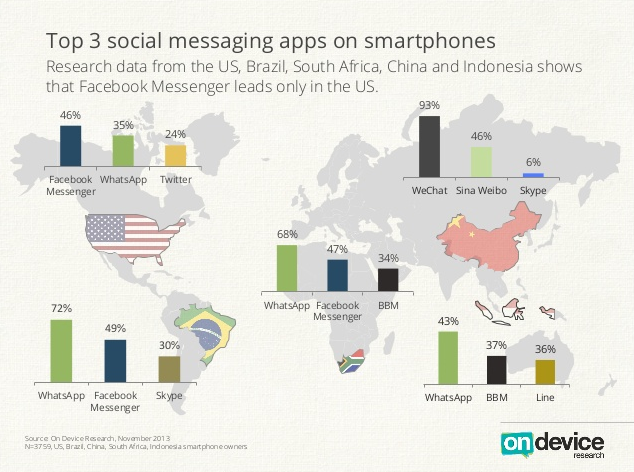
Businesses often wonder how the internet will morph and evolve, given the advent and tremendous rapid growth of mobile technology. Mobile has taken somewhat of a different path to desktop internet. According to Cade Metz (2015) writing for Wired magazine, that’s exactly what you would expect.
On mobile, YouTube has been found to comprise almost a fifth of all traffic, while Facebook accounts for more than 16 per cent. This is because as Metz points out:
“Streaming video from a service like YouTube eats up more network bandwidth than any other type of online application, and in recent years our smartphones and wireless networks have matured to the point where watching video from a handheld device is a common thing.”
Facebook has become even more successful off the back of that, since people share videos through Facebook and social networking encourages video sharing.
WhatsApp In Africa
WhatsApp is however, thought to be the next driver of mobile traffic. Facebook recently acquired WhatsApp, and while this app has not been adopted with the same energy in all places, in Africa it is booming. It is reported that WhatsApp makes up 11% of mobile traffic in Africa. There are some obvious reasons for this. One is that people can send messages considerably more cheaply than sending texts, and in some cases for free. But people do not just use WhatsApp for sending messages. They do a lot more besides. In fact, people use it for sending videos and photos now as well. Not only that, but it is also now possible to make phone calls over the internet by using WhatsApp. These developments are argued to have been fundamental in driving the increased traffic that has been seen in Africa. In fact, text is considered to only be a small part of what people do on WhatsApp, and of driving overall traffic.

These patterns can be seen to be different from those in the USA. In developing countries people do not have as much disposable income to spend on technologies. In addition, since markets for telecoms and networks are not as advanced as in developed countries, they tend to cost more in some cases. This has changed the way that the internet has developed in developing countries, and applications like WhatsApp have been leading the way in driving traffic. Overall, it is argued that in Africa web surfing makes up more than 20 per cent of mobile traffic and that this is double that of WhatsApp, yet WhatsApp has the highest figures for a specific service, way higher than any other service.
This is thought to be one of the reasons why Facebook purchased WhatsApp. Doing so has basically opened up the African market considerably, as well as other markets that face similar conditions. It allows Facebook to be more viable in these places and ultimately more popular as a result. It gives Facebook the opportunity to try and attract new users from a different means than before. This will also help it to spread new services to a much greater volume of people, leading to a higher chance of success with new endeavours. Video calling is anticipated to be the next big step.
Facebook in The Middle East
In the Middle East, things are thought to be a little different. Yet Facebook has still managed to commandeer a great deal of the traffic. It is explained that Facebook or Facebook-owned companies account for a lot of the traffic. For example, Facebook itself comprises 11 per cent of the mobile traffic, meanwhile WhatsApp only has three per cent. However, Facebook also owns Instagram, and traffic via this means comprises more than 10 per cent of traffic. What this means is that Facebook group companies have control of almost 25 per cent of the mobile internet traffic across the region.
Of course, Facebook is already doing very well indeed in other parts of the world, just in the guise of Facebook itself. In the USA this service comprises 16 per cent of mobile traffic and in excess of a further two per cent of wire line traffic. While some may critique Facebook’s activities, there is no denying that the company has made many of the right moves to dominate mobile traffic all over the world. Business strategists from other organisations should sit up and take note.

Paula Newton is a business writer, editor and management consultant with extensive experience writing and consulting for both start-ups and long established companies. She has ten years management and leadership experience gained at BSkyB in London and Viva Travel Guides in Quito, Ecuador, giving her a depth of insight into innovation in international business. With an MBA from the University of Hull and many years of experience running her own business consultancy, Paula’s background allows her to connect with a diverse range of clients, including cutting edge technology and web-based start-ups but also multinationals in need of assistance. Paula has played a defining role in shaping organizational strategy for a wide range of different organizations, including for-profit, NGOs and charities. Paula has also served on the Board of Directors for the South American Explorers Club in Quito, Ecuador.











